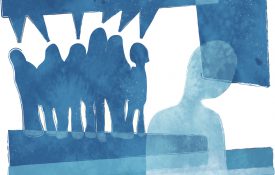-

Children with Restored Sight Show Impairments in Mental Mirroring
The authors of a new paper conclude that “visual experience is essential for the development of proper mirror system function.”
-

Intuition May Overpower Probability in Decision Making
From football to blackjack, simply detecting an error in judgement may not be enough to alter behavior. Visit Page
-
Op-Ed Calls for Civility in Psychological Science, Draws Mixed Reactions
A world-renowned geneticist’s newspaper opinion article about the discourse surrounding rigor in social psychology research is sparking a mix of kudos and criticism among scientists and journalists. In a January 21 article in The Boston Globe titled “For better science, call off the revolutionaries," Harvard University professor Pardis Sabeti points to "a current group of scientists and internet bloggers," spurred by new methods and statistical techniques to attempt to weed out faulty psychological science. She argues that some of these efforts have mushroomed beyond criticisms of past research into personal attacks against the scientists behind those studies.
-

Interventions May Help Kids Learn the ABCs of Executive Functioning
Executive functioning interventions may help kids from disadvantaged backgrounds close the academic achievement gap. Visit Page
-
Shiffrin, Dosher Receive NAS Atkinson Prize
APS Fellows Richard M. Shiffrin and Barbara Dosher are the recipients of the National Academy of Sciences (NAS) 2018 Atkinson Prize in Psychological and Cognitive Sciences for their pioneering work on memory, attention, and learning. This biennial prize is awarded in recognition of advances in the psychological and cognitive sciences that have significantly influenced the formal and systematic theory of these fields. Shiffrin, Luther Dana Waterman Professor of Psychological and Brain Sciences at Indiana University, began his work on human memory in 1968, when he proposed the Atkinson–Shiffrin model of modal memory alongside APS William James Fellow Richard C.
-

Unpacking the Link Between Teen Victimization and Mental Illness
A longitudinal twin study suggests that victimization makes general and far-reaching contributions to mental disorders. Visit Page

